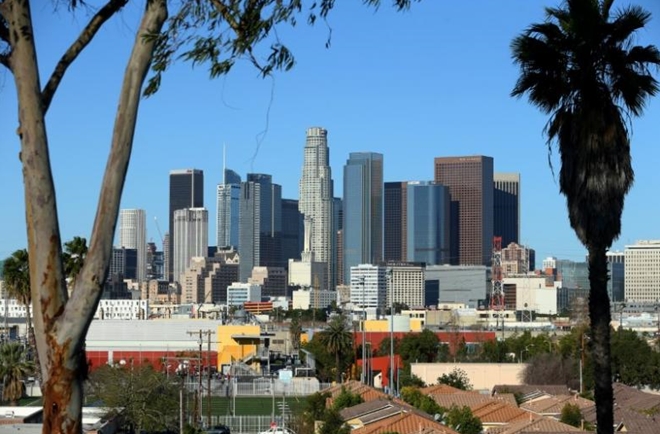Many states still struggling despite growing U.S. economy
- Stocks start week steady after strong quarter, U.S. policies in focus
- Asia stocks weaker, dollar slips as Fed continues to weigh
- Asia stocks set for best week since July, dollar dips further after Fed
The broad recovery has benefited large, economically diverse states like California and Texas, ratings agencies say, while states heavily dependent on oil revenues, like North Dakota and Alaska, and those like Illinois that are grappling with large unfunded pension obligations, have seen budget deficits bloom.
That has left those struggling states with painful decisions over spending cuts and tax increases, and ill prepared to deal with another economic downturn or cuts to federal money tied to the Medicaid program.
 |
| A view of downtown Los Angeles, California, U.S. February 23, 2017. REUTERS/Mike Blake |
S&P Global has downgraded 11 states compared to just two upgrades since January 2016. It has 11 states on negative outlook, which means the ratings agency believes more than 20 percent of states are in danger of a credit downgrade.
The uneven nature of the bounce back is unusual in post-recession U.S. economic history, analysts said.
"The economy is showing signs of strength. The stock market is at a record high, the Federal Reserve has raised (interest) rates, and economists predict growth will continue," said Gabe Petek, an analyst with S&P Global.
"But when you look back to the state sector, many continue to lag their forecasts or are projecting budget gaps," he said.
Half of the states face budget shortfalls despite overall economic growth and lack the revenue needed to maintain services at existing levels in 2018, according to a recent report by the Center on Budget and Policy Priorities (CBPP).
LOW-PAYING JOBS
Despite a national unemployment rate of just 4.9 percent, or less than half of a 2010 peak, growth has been in the kind of jobs that do little to boost state revenues reliant on higher income and sales tax receipts.
States have been adding low-wage and part-time jobs, a reality that some state lawmakers have yet to catch up to when making budget forecasts.
Despite seeing its unemployment rate fall steadily since 2010, Maryland still had to address a $400 million revenue shortfall in its $43.5 billion state budget last month.
Job growth in the health care sector, for example, has centered on low-wage home health care aides, said Nick Samuels, an analyst at Moody's Investors Service.
An increase in leisure and hospitality industry jobs has also helped push down the unemployment rate without translating into the flood of revenue for state tax coffers that relatively higher-paying professional and business services positions would typically provide, he said.
And some states that have failed to add higher-paying jobs have also had to grapple with population shifts as workers seek better employment elsewhere, further pressuring tax revenues.
Illinois, a state with a record 22-month budget stalemate, has $12.7 billion in unpaid bills and an unfunded pension liability of $130 billion. It saw its population shrink 0.6 percent between 2013 and 2016, according to Moody's, while at the same time the national population increased 2.2 percent.
Increasing revenue from taxes becomes more difficult as the population declines, adding another layer of fiscal pressure.
OILY STRUGGLES
Among the states struggling the most to close budget gaps are oil producers and refiners like Oklahoma, Louisiana, North Dakota and Alaska, which rely on taxes on energy production and often high-paying oil industry salaries to help fill state coffers. They were hit hard by the collapse of oil prices beginning in mid-2014.
Despite a modest rebound this year, U.S. light crude oil, which settled at $51.70 a barrel on Wednesday, still lags the soaring highs of over $100 hit during the summers of 2013 and 2014. CLc1
Falling crude prices had also brought expectations that lower gasoline prices would fuel consumer spending on other items and net some states higher sales tax revenues. That boost did not materialize, however, as consumers instead held onto their extra disposable income.
"The recession was so deep that it had a lasting impact and people are holding on to some of that additional disposable income that they are seeing because of the low gas prices," said Emily Raimes, an analyst at Moody's.

